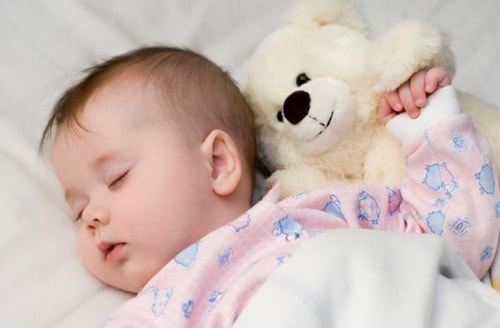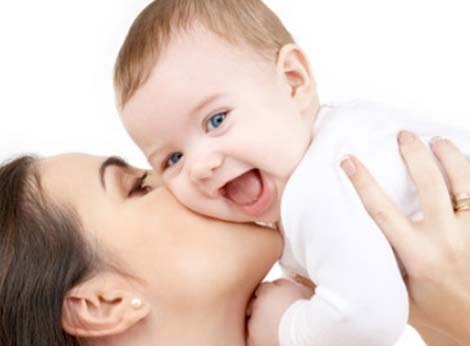Signs of calcium deficiency in children
Difficulty sleeping, crying, hiccups... are some of the signs of calcium deficiency in children that mothers need to be aware of.
Below are some signs of calcium deficiency in children that mothers need to know like the back of their hand. Mothers should rely on these signs to "diagnose" and promptly rescue their children.
1. Difficulty sleeping, poor sleep
Many parents believe that children will not suffer from sleep problems or insomnia. However, some experts point out that about ¼ of children suffer from sleep problems or insomnia at different levels.
This phenomenon is mainly manifested through snoring, teeth grinding, being easily awakened, difficulty breathing while sleeping... There are many causes leading to this condition in children, and one of the causes that mothers need to pay attention to is that children lack calcium.
Calcium helps regulate the balance between the excited and inhibited states of the cerebral cortex. When the body lacks calcium, it affects the metabolic activities of the central nervous system, leading to a state of the cerebral cortex being constantly excited, causing the child to be unable to sleep even when it is time to go to bed.
2. Sweating a lot at night
Newborns who are deficient in vitamin D often suffer from night sweats. Children under 1 year old are often deficient in vitamin D because this is the stage when the skeletal system develops most strongly. In addition, premature babies, low birth weight babies, children with infectious diseases, children with prolonged digestive disorders, children with rickets, etc. are subjects with severe vitamin D deficiency.
If you pay attention, you will easily notice that your child often sweats a lot on the forehead and neck area even when the weather is cold, especially when the child is sleeping, so the child often loses hair at the back of the neck.
 |
| Infants with vitamin D deficiency in the newborn period often suffer from night sweats. |
When children sweat a lot, mothers should use fans, air conditioners, dress them in thin clothes, keep them in a cool room, give them plenty of water to avoid dehydration... If children also sweat a lot at night, mothers should regularly use a soft, dry towel to wipe their bodies, to avoid sweat causing colds for children due to sweat being absorbed back into the body.
3. Startled crying at night
Because calcium deficiency affects the functioning of the central nervous system, the active ingredient slows down neurotransmission (from tryptophan to melatonin), relaxes the brain, and inhibits deep sleep, causing children to be startled, have difficulty sleeping, and have drowsy and restless sleep.
In addition, children may also have laryngospasm causing difficulty breathing, regurgitation due to stomach cramps... Therefore, children often have trouble sleeping and cry.
Lack of calcium also slows down the metabolism, causing children to grow slowly and become stunted. Poor health combined with restless sleep will make children easily exhausted and tired, making their sleep more restless and more irritable.
The baby's cry is abnormal, screaming, stiffening of the whole body, red and purple face, the more you coax, rock and feed the baby the more the baby cries. Each time like that can last for several hours or even all night.
4. Slow perception and difficulty adapting to everything around
This is also one of the signs of calcium deficiency in children. When children are deficient in calcium, they are prone to psychological disorders and slow development. This can lead to children being slower in cognition than other children and having poorer reflexes. Many children also show signs of not caring about things and people around them.
5. Anorexia, loss of appetite
Children with anorexia, loss of appetite or only eating their favorite foods are also related to calcium deficiency, calcium intake into the body is not enough, easily leading to poor appetite. Prolonged anorexia in children will greatly affect the child's development, at the same time causing damage to the child's intelligence and cognitive ability.
Anorexia, the body's inability to absorb important nutrients will weaken the immune system, causing weak resistance, which will easily "open the way" for disease-causing viruses to attack.
6. Baby often has aches and pains in legs
Calcium is the main component of bones and teeth. A lack of calcium makes children's bones weak, and the bones cannot complete their task of supporting the body, causing children to often have symptoms of bone pain, especially in the legs and arms while moving or carrying something.
Soft and weak bones also make children lazy to move and sit in one place. Laziness will make children become weaker and more susceptible to obesity.
In addition, if the mother notices that her child often has leg cramps, it also proves that the child is lacking calcium. This symptom can be easily recognized in older children from 18 months of age and older.
7. Hiccups and vomiting
Symptoms of the baby having laryngospasm causing difficulty breathing, hiccups, regurgitation… are also signs of calcium deficiency. Severe cases can also cause apnea and rapid breathing, the baby has episodes of increased heart rate and can cause heart failure.
8. Fontanelle closes too late
The fontanel is the soft area between the skull bones above the forehead of a newborn baby. Closing the fontanel too early or too late is not good. If the fontanel closes too early, it will limit brain development and affect intelligence. If the fontanel closes late, it can be a sign that the child is calcium deficient, causing rickets, malnutrition, or an abnormally large brain. Normally, the fontanel will close when the child is 12-18 months old.
9. Children who walk late have deformed bones and joints.
 |
| Most calcium deficiencies in children under 1 year of age manifest in the leg area. |
Most calcium deficiencies in children under 1 year old are manifested in the leg area. The legs are bowed in the shape of an O or X, the muscles are loose and weak. Soft bones cause children to learn to roll over, crawl, stand, and walk very late compared to their peers.
10. Ringworm
The phenomenon of baby hair loss in the shape of a ring (hair on the back of the neck does not grow) can be an early sign of rickets, the main cause of which is vitamin D deficiency leading to calcium metabolism disorders. This condition not only occurs in malnourished children but also in obese children. When this happens, mothers should pay attention to the health of their children.
11. Tooth decay, slow tooth growth
Calcium is also an important component of teeth. Therefore, calcium deficiency in the body also affects teeth, causing tooth decay. Children with calcium deficiency may have teeth later than children of the same age. Some babies still have normal teeth when they reach teething age, however, crooked teeth, uneven spacing between teeth, loose teeth, and early tooth loss are also signs of calcium deficiency in children.
To help children have the necessary amount of calcium in their bodies, mothers should know how to supplement enough calcium in their children's daily menu with foods such as shrimp, crab, fish, spinach, soybeans... For infants, daily sunbathing is an effective way to help them absorb calcium through the process of synthesizing vitamin D.
According to Alobacsi.vn






